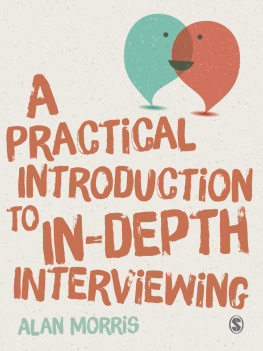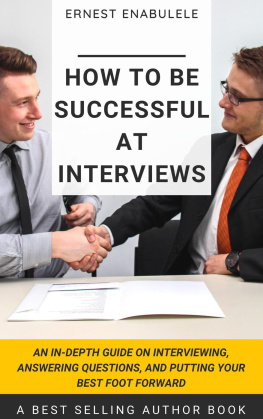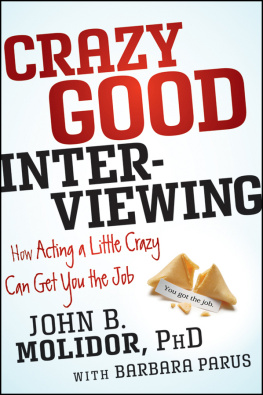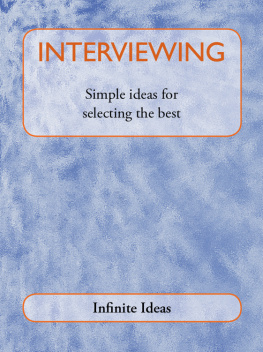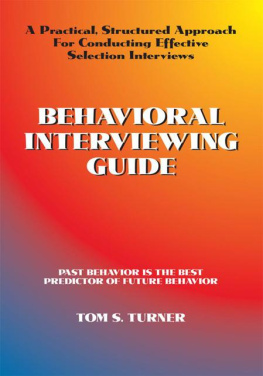CHAPTER 1 What is a job interview and why do organizations use it?
DOI: 10.4324/9781003171089-1
The role of a job interview when selecting employees
Rachel and Kareem just graduated from the same university with a degree in mechanical engineering. They are ready to enter the labour market and start their quest for the ideal job. They both have identified a handful of organizations that have a good reputation and are looking for engineers with backgrounds like theirs. But it is their first time applying for real jobs. What will the hiring process look like for them? Here is a snapshot of what they might be expected to face.
Initially, Rachel and Kareem will be asked to formally apply to each position (most likely online) and provide information that will allow the hiring organization to engage in an initial screening procedure. With many online applications, this might also involve completing a standardized form including information about their education, work experience, or availabilities. They may also be asked to send or upload a resume, a cover letter, proofs of their education credentials, and perhaps a list of references. This initial screening stage has two objectives. First, before investing time and resources in assessing candidates, the organization wants to ensure that applicants like Rachel and Kareem possess the basic qualifications to perform the job. Second, if they apply for the same position, Rachel and Kareem will compete against each other and likely other job applicants for the same position (or positions). If the ratio of the number of applicants to the number of jobs available is quite large, the organization may not have the resources to assess all applicants in depth. It thus has to make quick screening decisions based on limited information in order to eliminate the least qualified candidates and focus only on a smaller pool of promising individuals.
If Rachel and Kareem pass this first hurdle, they may be asked (on some occasions) to complete tests to further assess personal characteristics that the organization deems important for joining their team. This can include assessments of cognitive abilities, personality traits, workstyle preferences, integrity, or values. But what is usually at the core of the selection process is the job interview. Surveys conducted around the world are unanimous: most organizations include some form of job interview as part of their hiring process.).
As we will see in more detail later, interviews can take multiple forms, can be more or less effective at identifying the best candidate for the position, and can leave positive or negative memories for those who have experienced them. Yet, independently of all this, the job interview always has a special status for organizations. It is a gate through which almost all job applicants have to pass before they become organization members. The interviewer (or interviewers, in some cases) is the gatekeeper, whose role is to verify that the applicant is worthy before they can enter. In other words, if the organization is a high-end nightclub, the interviewer is the bouncer deciding if party-seekers at the door correspond to the profile of clients that the club wants. Despite the important role of job interviews, both applicants and interviewers are often non-experts who enter the interview room with mixed feelings. They understand the importance of this encounter for their future (or the future of their team, department, or organization) and thus want to demonstrate professionalism, impress their interaction partner, and make optimal decisions. At the same time, they may be uncertain about what to expect from the interview, experience anxiety about how to behave, and worry about making mistakes.
The goal of this book is to present an overview of the job interview that can be useful to a variety of audiences that have an interest in interviews: applicants currently on the job market, professional Human Resource (HR) managers, managers who are not HR experts but have to act as interviewers to select future employees, or psychology and management students who want to understand how interviews really work. Unlike the majority of interview-related books available on the market, the present text is not a how-to guide designed to help applicants beat the system with rehearsed answers to popular interview questions. It can, nevertheless, be helpful to better understand what could be expected from an interview, how to best prepare for it, and what strategies or behaviours can help increase the chances of obtaining a job offer. It is also not a book written by a management guru or seasoned interviewer describing their view on the best interviewing techniques based personal experiences (although I have experience interviewing applicants and helping organizations design interviews). Rather, it is a summary of the accumulated evidence about job interviews based on decades of theoretical and empirical research performed by psychology and management scholars from all around the world.
Throughout this book, I will present scientific facts about the psychology of job interviews. Some of those facts may appear intuitive to the reader, whereas others may contradict popular beliefs or personal experiences, and hopefully the book will encourage readers to rethink some of their interviewing practices. Although I may use some technical concepts here and there, I will refrain from using scientific jargon or from reporting some of the complex statistical analyses behind my arguments. However, I provide the reader with references to some key academic articles should they wish to pursue such enriching (yet possibly difficult) additional readings. I also illustrate these facts with numerous examples and practical recommendations, which will help job applicants to successfully prepare for interviews and help interviewers to conduct interviews and make optimal selection decisions. For instance, throughout the book we will follow our two fictitious applicants, Rachel and Kareem, in their experiences as applicants interviewing for various positions. We will also see what happens (or could happen) on the other side of the table with interviewers from various organizations (fictive ones, although mostly based on real cases).
The pursuit of fit between applicants and organizations
The job interview sometimes has the reputation of being similar to a police interrogation, in which the applicant is seen as a suspect and the interviewer is portrayed as an investigator trying to uncover evidence of problems associated with past work experiences. I do not pretend that interviewers never act as police investigators (some of them do!), nor do I suggest that applicants never lie or hide things that may hurt their candidacy (they sometimes do, as I discuss in
Both applicants and interviewers send signals to each other. For job applicants, the interview is a platform to present their knowledge, skills, abilities, and past experiences or accomplishments, ideally aligning those qualities and successes with the position they are applying for or the organizations values. Similarly, interviewers use the interview to describe the features of the job; the team or department the applicant may be joining; or, more broadly, the values, mission, or objectives of the organization. In parallel to sending signals, applicants and interviewers also interpret and analyse the signals they receive. Applicants evaluate the information about the job to verify that it corresponds to their profile and meets their career ambitions. They also gauge the information about the team and organization to estimate whether they would enjoy working in such an environment. At the same time, interviewers assess whether the applicants qualities correspond to what the organization is looking for.


